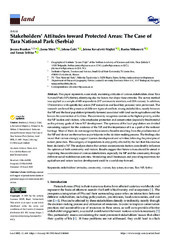Prikaz osnovnih podataka o dokumentu
Stakeholders’ Attitudes toward Protected Areas: The Case of Tara National Park (Serbia)
| dc.creator | Brankov, Jovana | |
| dc.creator | Micić, Jasna | |
| dc.creator | Ćalić, Jelena | |
| dc.creator | Kovačević-Majkić, Jelena | |
| dc.creator | Milanović, Ranko | |
| dc.creator | Telbisz, Tamás | |
| dc.date.accessioned | 2022-10-04T17:18:51Z | |
| dc.date.available | 2022-10-04T17:18:51Z | |
| dc.date.issued | 2022 | |
| dc.identifier.issn | 2073-445X | |
| dc.identifier.uri | https://dais.sanu.ac.rs/123456789/13310 | |
| dc.description.abstract | This paper represents a case study examining attitudes of various stakeholders about Tara National Park (NP) (Serbia), identifying also the factors that shape these attitudes. The survey method was applied to a sample of 405 respondents (197 community members and 208 visitors). In addition, 15 interviews with specific key actors (NP executives and local key persons) were performed. The research confirmed the presence of different types of conflicts among stakeholders, mostly between the NP and the local population (primarily farmers) associated with land use in agriculture and the ban on the construction of facilities. The community recognizes tourism as the highest priority, unlike the NP leaders and visitors, who emphasize protection and conservation (especially biodiversity) as the primary goals of future NP development. The opinions of the local population are divided concerning support for the existence of the NP and the importance of it as a part of the national heritage. Most of them do not recognize the economic benefits resulting from the proclamation of the NP and do not see themselves as participants in the decision-making process. The findings also reveal that visitors strongly support tourism development and activities following the principles of nature protection. This category of respondents is only partly affected by the fact that this area has been declared a NP. The analysis shows that certain socioeconomic factors considerably influence the opinions of both community and visitors. Results suggest that future actions should be aimed at improving the coordination of various stakeholders, especially the NP and the community, through different social mobilization activities. Stimulating small businesses and providing incentives for agriculture and nature tourism development could be a useful step forward. | sr |
| dc.language.iso | en | sr |
| dc.publisher | Switzerland, Basel : MDPI | sr |
| dc.relation | K124497 project | sr |
| dc.rights | openAccess | sr |
| dc.rights.uri | https://creativecommons.org/licenses/by/4.0/ | |
| dc.source | Land | sr |
| dc.subject | stakeholders’ attitudes | sr |
| dc.subject | community | sr |
| dc.subject | visitors | sr |
| dc.subject | key actors | sr |
| dc.subject | tourism | sr |
| dc.subject | Tara NP | sr |
| dc.subject | Serbia | sr |
| dc.title | Stakeholders’ Attitudes toward Protected Areas: The Case of Tara National Park (Serbia) | sr |
| dc.type | article | sr |
| dc.rights.license | BY | sr |
| dc.citation.spage | 468 | |
| dc.citation.volume | 11 | |
| dc.citation.issue | 4 | |
| dc.identifier.wos | 00078626290000 | |
| dc.identifier.doi | 10.3390/land11040468 | |
| dc.identifier.scopus | 2-s2.0-85128351143 | |
| dc.description.other | This research has been supported by the National Research, Development and Innovation Office Hungary (NKFIH) K124497 project and by the Ministry of Education, Science and Technological Development of the Republic of Serbia | |
| dc.type.version | publishedVersion | sr |
| dc.identifier.fulltext | http://dais.sanu.ac.rs/bitstream/id/53128/bitstream_53128.pdf | |
| dc.identifier.rcub | https://hdl.handle.net/21.15107/rcub_dais_13310 |

